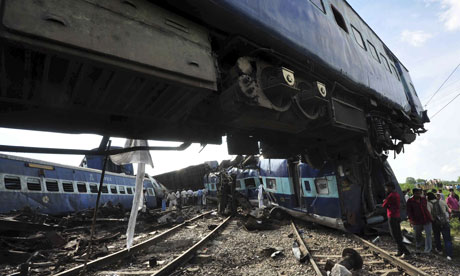
Packed express train derails in Uttar Pradesh, killing more than 30 people and injuring at least 100 more.The Kalka Mail train was on its way from from Howrah near Kolkata to Kalka in the foothills of the Himalayas when it derailed in Uttar Pradesh.
A packed express train has derailed in northern India, killing at least 31 people and injuring more than 100 others.
The train was on its way from Howrah station near Kolkata to Kalka in the foothills of the Himalayas when 12 coaches and the locomotive left the tracks near the town of Fatehpur in Uttar Pradesh state, senior railway official AK Jain said.
The cause of the derailment was not immediately clear but it appeared that the driver had applied the emergency brakes, he added.
At least 31 people were killed and rescue workers pulled at least 100 injured passengers out of the wreckage, said Brij Lal, a state police official.
Television footage showed that at least one coach had been shunted over the roof of another and was dangling precariously. Another coach was thrown away from the rest of the train.
The death toll was likely to rise as rescuers made their way through the coaches using gas cutters to clear the twisted metal, Lal said. "We're trying to cut into the coaches and rescue those still trapped inside."
Medical personnel rushed to the area, about 75 miles south-east of Lucknow, the capital of Uttar Pradesh. Army helicopters ferried the most seriously injured victims to hospitals and 30 military engineers had joined the rescue efforts, Lal said.
TV stations showed local residents helping injured passengers away from the train and breaking the windows of coaches to help those trapped inside.
The number of passengers on board was not known. Express trains normally carry about 1,000 people and travel at speeds of up to 80mph.
India's rail network is one of the largest in the world and carries about 14 million passengers a day. Accidents are common, with most blamed on poor maintenance and human error.
The train was on its way from Howrah station near Kolkata to Kalka in the foothills of the Himalayas when 12 coaches and the locomotive left the tracks near the town of Fatehpur in Uttar Pradesh state, senior railway official AK Jain said.
The cause of the derailment was not immediately clear but it appeared that the driver had applied the emergency brakes, he added.
At least 31 people were killed and rescue workers pulled at least 100 injured passengers out of the wreckage, said Brij Lal, a state police official.
Television footage showed that at least one coach had been shunted over the roof of another and was dangling precariously. Another coach was thrown away from the rest of the train.
The death toll was likely to rise as rescuers made their way through the coaches using gas cutters to clear the twisted metal, Lal said. "We're trying to cut into the coaches and rescue those still trapped inside."
Medical personnel rushed to the area, about 75 miles south-east of Lucknow, the capital of Uttar Pradesh. Army helicopters ferried the most seriously injured victims to hospitals and 30 military engineers had joined the rescue efforts, Lal said.
TV stations showed local residents helping injured passengers away from the train and breaking the windows of coaches to help those trapped inside.
The number of passengers on board was not known. Express trains normally carry about 1,000 people and travel at speeds of up to 80mph.
India's rail network is one of the largest in the world and carries about 14 million passengers a day. Accidents are common, with most blamed on poor maintenance and human error.

0 comments:
Post a Comment